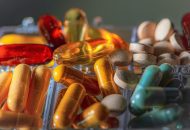Your Medications May Be Hurting Your Teeth

WASHINGTON — According to the Centers for Disease Control and Prevention, nearly seven in 10 adults between the ages of 40 and 79 used at least one prescription drug in the past 30 days in the United States, and approximately one in five used at least five prescription drugs.
While it is hoped that all this pill-popping is helping people feel better and enjoy active lives, a new report from the American Association of Retired People suggests some of these medications may be wreaking havoc on people’s mouths.
Below is the AARP’s list of common culprits when it comes to oral health problems linked to medications:
1. Anticoagulants commonly prescribed for heart attack and stroke prevention. The problem? Excessive bleeding from the gums or tooth sockets. Among the most commonly prescribed: warfarin (Coumadin), rivaroxaban (Xarelto) and apixaban (Eliquis). These drugs are also used by those who’ve recently undergone knee or hip replacement. Other meds that may lead to bleeding: antiplatelet meds such as clopidogrel (Plavix), which are primarily used to prevent the recurrence of blood clots following a heart attack or stroke.
2. Gummy vitamins and other medications with added sugar.
The Problem? If you consume sugar frequently, this reduces the pH level of the saliva, causing it to become more acidic. Frequent pH drops in the saliva can cause the mineral structure of the tooth to break down — and, over time, cause cavities.
3. Antibacterial mouth rinses. The problem? Discolored teeth (in the form of yellowish-brown stains) and an increase in tartar. That dullness, by the way, is usually caused by the interaction of the antiseptic with chromogens, pigmented compounds found in foods (berries and coffee have high concentrations).
4. Calcium channel blockers used to lower blood pressure. The problem? They can cause gingival overgrowth, a buildup of swollen gum tissue that begins to grow over teeth, creating a friendly environment for bacteria.
5. Oral bisphosphonates. Commonly prescribed for osteoporosis to strengthen bones, they can cause osteonecrosis of the jaw, a rare but potentially serious complication of oral surgery that causes death of the jawbone tissue.
6. Some antidepressants and anxiety meds.
The problem? Dry mouth that can increase risk for cavities, gum disease and canker sores. Saliva not only lubricates the mouth, but it also neutralizes the acid produced in the mouth. But as we age, our salivary glands become less active, making us more susceptible to tooth decay.
Common culprits: Dry mouth is a potential side effect of literally hundreds of medications that interrupt the secretion of saliva. In particular, drugs that alter our central nervous system, including anxiety meds such as escitalopram (Lexapro) and sertraline (Zoloft), and antidepressants such as fluoxetine (Prozac) and alprazolam (Xanax).
7. Nonsteroidal anti-inflammatory drugs. The problem? Painful soft tissue reactions, including mucositis (inflammation of the mucous membrane that lines the inside of the mouth), and ulcerated sores, which can occur inside the mouth or on the tongue.
Common culprits: NSAIDs such as ibuprofen and aspirin, for starters. Other potential irritants include hypoglycemic agents for type 2 diabetes such as metformin (Fortamet or Glucophage); beta-blockers, including metoprolol succinate (Toprol XL) and bisoprolol (Zebeta), used by those with angina, high blood pressure and abnormal heart rhythm to help the heart beat more slowly; and immunosuppressive agents, among them prednisone (Deltasone) and methotrexate (Otrexup and Trexall), which prevent the immune system from damaging healthy cells and are usually taken by people with autoimmune diseases such as rheumatoid arthritis, multiple sclerosis and inflammatory bowel disease.
The AARP report also includes “fixes” for counteracting these conditions. The full article can be found here.

























